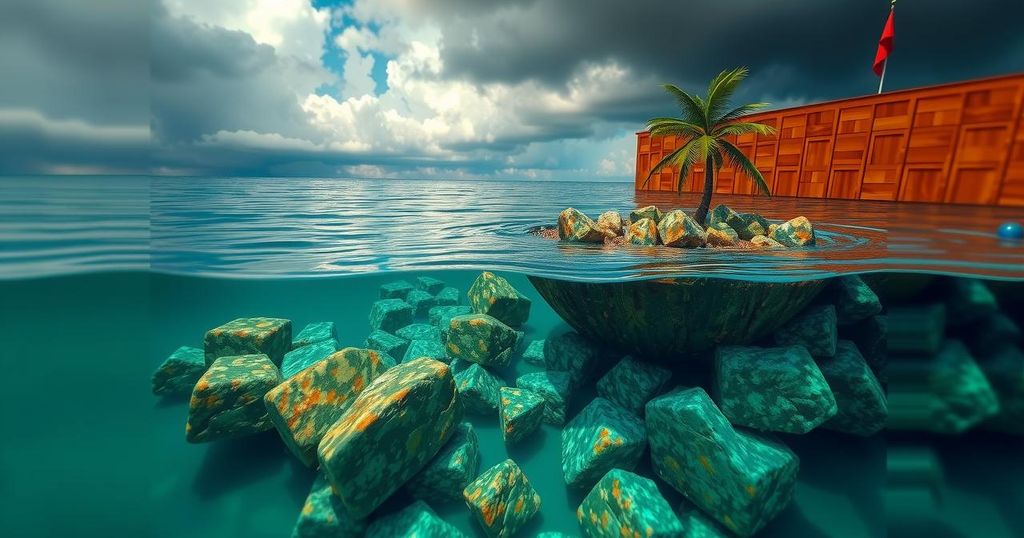The International Court of Justice is hearing a significant case brought by small island nations seeking accountability from major polluters for climate change impacts. The case emphasizes the existential threats these nations face due to rising sea levels, with influential statements from leaders highlighting the urgency of their situation. Although the court’s decision will not be legally binding, it could inspire future legal actions and strengthen the push for climate justice.
The International Court of Justice (ICJ), the UN’s principal judicial body, is currently hearing a groundbreaking case concerning the climate change struggles faced by several small island nations, with the case considered the largest in its history. These nations are urging that major polluters be held accountable for their contributions to climate change, which they believe directly threatens their existence. The case follows a request from the UN General Assembly for an advisory opinion on states’ obligations regarding climate change, addressing concerns raised by vulnerable nations fearing potential submergence due to rising sea levels.
During the opening session, Arnold Kiel Loughman, attorney-general of Vanuatu, underscored the critical nature of the situation, stating, “The survival of my people and so many others is on the line.” He elaborated on how domestic laws are insufficient to tackle the climate crisis, emphasizing the obligations of states to take proactive measures to mitigate environmental harm. Although the court’s decision will not be enforceable, it holds the potential to inspire future legal actions, providing a strong symbolic message in the ongoing battle against climate change.
In a broader context, rising sea levels—averaging an increase of approximately 1.7 inches globally since 2013—are particularly pronounced in the Pacific region. Vanuatu and other affected nations argue that historically, a few industrialized countries have disproportionately contributed to greenhouse gas emissions, causing severe and disproportionate impacts on developing nations. Ralph Regenvanu, Vanuatu’s climate change envoy, noted that emissions have surged over the past few decades, reaching unprecedented levels by 2023.
As this historic case unfolds, the ICJ will engage with perspectives from numerous countries and organizations, examining legal obligations and consequences linked to greenhouse gas emissions. This hearing is unprecedented, involving 99 countries—marking it as the largest assembly in the court’s nearly 80-year history. Following discussions at a recent UN climate meeting, wealthy nations pledged a commitment of at least $300 billion annually by 2035 to assist poorer nations affected by climate disasters; however, this figure remains significantly short of the estimated $1.3 trillion needed annually.
Youth activists like Vishal Prasad, from the Pacific Islands Students Fighting Climate Change, advocate for immediate attention to the crisis, categorizing it as an existential threat. The judges of the ICJ will deliberate on the obligations of states under international law concerning climate protection and the ramifications for governments failing to address significant climate harm. The case highlights the urgency and gravity of climate change’s impact on future generations, especially in the most vulnerable nations.
The case before the International Court of Justice highlights the exceptional challenges faced by small island nations in relation to climate change. With rising sea levels threatening to submerge some of these islands, the legal proceedings aim to seek accountability from nations that contribute significantly to greenhouse gas emissions. This initiative reflects the broader demands by vulnerable nations for stronger international legal frameworks to combat climate change and ensure their survival.
The ongoing proceedings at the International Court of Justice represent a pivotal moment in the global climate change dialogue, particularly for small island nations vulnerable to environmental degradation. The case calls for accountability from major polluters, emphasizing the need for international cooperation to ensure the survival of affected populations. While the ICJ’s decision will not be legally binding, it may provide a foundational precedent for future climate-related legal actions and underscore the urgent necessity for climate justice.
Original Source: www.irishnews.com






